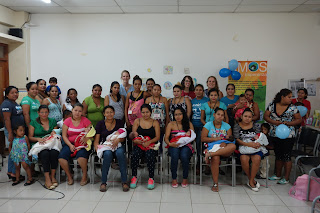I usually think of peeing in a cup (at the doctor’s office,
of course!) as a necessity, or as a shameful task (who wants to put a cup full
of pee with your name on it on a counter where everyone can see it?), or as a
risky challenge (will it really all go in the cup? what else might get in the line of fire?),
but today for the first time, I realized that peeing in a cup is also a privilege.
After my regular Wednesday Pregnancy Support Group and
Childbirth Class, 16-year-old Maria pulled me aside. She explained to me that while she was almost
5 months pregnant, she still had not gone to see a doctor. I could tell she was a little ashamed to
admit this, because every week, no matter what the topic, I reinforce the
importance of regular prenatal care. She
wanted to know what she had to do to start receiving prenatal care at the
clinic where our group meets. I very
naively told her “Oh, you just have to schedule an appointment with the receptionist,”
thinking that I had fully answered her question and taken care of her
needs.
“But what do I need to bring?” I didn’t understand her
question at first… Yourself? Your baby in your womb? A full bladder? Then I
noticed she was looking at the prices listed in the clinic, and I realized what
she was really asking was “How much is this going to cost me?”
I brought her over to Dra. Sonia to better answer her question. She first told her the price of each doctor’s
visit--$5. Then she listed the prices of
each lab test that needs to be done throughout pregnancy, a list of about 10
exams, ranging in price from $2-$10 each.
And then on top of that the price of an ultrasound. With each number stated, I saw in Maria’s
face the likelihood of her actually receiving prenatal care go down. She took the list of prices with her, but I
did not see her going to the receptionist to set up an appointment like I had originally
suggested.
After she left, Dra. Sonia and I chatted for a while about
this conundrum—we acknowledged the extreme importance of these women receiving
prenatal care, but we also acknowledged the barrier of the high price tag
associated with it. It may not seem like
a lot to you and me, but the cost of a regular visit and a routine urine exam (about
$7.50 total) is what many Nicaraguans make in a full day of work. Dra. Sonia said that she always gives the
women the order for the $2.50 urine exam but many end up leaving without doing
it because they can’t afford the added expense.
I left the clinic today feeling guilty (I’ve never had to
worry about how I’m going to pay for a routine medical exam), disgusted at the
injustice of our world (why should Maria have to worry about the cost when so
many others don’t have to?), sad (thinking about how many problems past and
future could have been or would be avoided if women had access to the care they
needed), and motivated (I see the need for change and want so badly to do
something about it).
I don’t know what will come of it, but Dra. Sonia and I
ended our conversation dreaming about a sponsorship program that would allow
donors to sponsor a pregnant woman in my group, providing them with the medical
care they need throughout their pregnancy.
My hope is that in time, I will be writing another blog post asking you
to consider sponsoring one of these women who are so dear to me. Stay tuned!
 |
| Last year's group picture |







